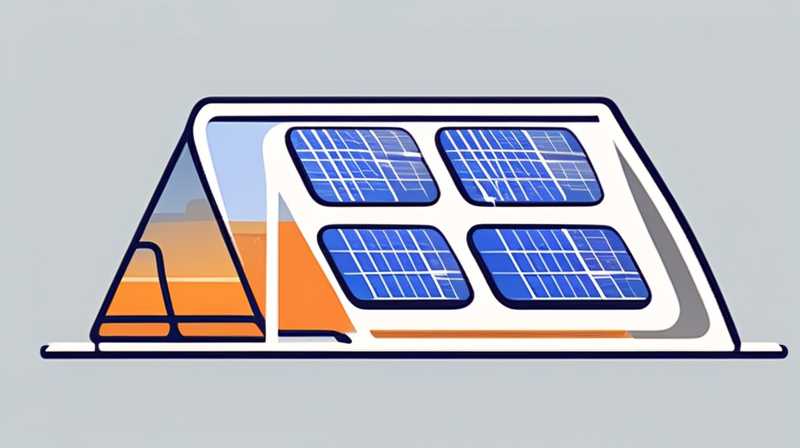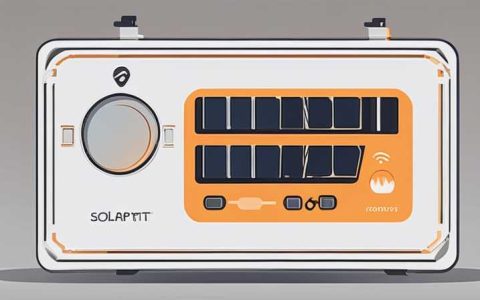
1. Understanding the Solar Panel Contract Signing Process is essential for a successful installation and satisfaction with the system, 2. A thorough review of terms and conditions can prevent future disputes, 3. Consulting with legal and solar experts aids in making informed decisions, 4. Seeking clarity on warranty and maintenance obligations ensures long-term performance.
A solar panel contract outlines the responsibilities and expectations between the consumer and the solar provider. Signing this document requires careful consideration of various factors, from terminology to obligations. Customers should prioritize understanding every section to protect their investment and ensure compliance. Neglecting to read the fine print could lead to unforeseen problems, while a well-informed agreement sets the foundation for a successful solar energy implementation.
1. OVERVIEW OF SOLAR PANEL CONTRACTS
The solar panel contract serves as a detailed agreement that establishes the relationship and responsibilities of both the homeowner and the solar energy provider. It demarcates the framework within which the installation, operation, and maintenance of solar panels will occur. This document typically includes vital information about costs, timelines, warranty conditions, installation specifics, and maintenance obligations. Without a comprehensive understanding of these elements, one risks entering a potentially detrimental agreement.
Examining the essence of a solar panel contract reveals its role as a safeguard for both parties involved. Homeowners expect quality service and performance from solar providers, while providers seek payment and adherence to agreed-upon terms. Consequently, this mutual dependency necessitates clarity in the contract. The language used should be straightforward, avoiding legalese that may obscure important obligations. Essential terms must be clearly defined to facilitate subsequent implementation of the solar system without misunderstandings.
2. KEY COMPONENTS OF SOLAR PANEL CONTRACTS
Understanding the critical components of a solar panel contract is fundamental in ensuring a satisfactory installation process. Key elements typically include the scope of work, payment terms, warranties, and dispute resolution procedures. Each of these areas demands careful examination and consideration to avoid complications down the line.
SCOPE OF WORK
The scope of work delineates what the solar provider is responsible for during the installation and maintenance processes. This section must clearly articulate the specific tasks to be performed, including installation methodologies and timelines. These stipulations ensure that both parties have a shared understanding of the expected outcomes and timelines, thereby minimizing project delays or misunderstandings.
In addition, identifying the responsibilities regarding site assessments, permitting, and potential engineering requirements is crucial. Essentially, a detailed scope of work can significantly enhance the owner’s confidence in the contract. It represents a commitment by the installer to adhere to specific standards and practices that align with the expectations of the homeowner.
PAYMENT TERMS
Payment terms are another vital aspect of the solar panel contract. This section outlines the total cost of the installation, including any applicable financing options, rebates, and incentives that may reduce the overall price. A clear explanation of the payment schedule, including deposit amounts, milestone payments, and final payments, contributes to a transparent transaction process.
Moreover, this section must stipulate any potential payment contingencies or penalties in the event of failure to meet the agreed-upon conditions. Understanding these terms can empower homeowners to budget effectively while ensuring they are aware of their financial obligations throughout the process.
3. WARRANTY AND MAINTENANCE CONSIDERATIONS
Warranties and maintenance conditions are essential to consider when signing a solar panel contract. An in-depth analysis of these clauses can predict the longevity and efficiency of the solar energy system over time.
WARRANTY CLAUSES
Warrantees must be explicitly stated, detailing what is covered, for how long, and any conditions for maintaining coverage. It’s crucial to differentiate between the warranties offered by the solar panels themselves and those provided for the installation. An extensive warranty reflects the provider’s confidence in their products, affirming their commitment to quality workmanship and durable systems.
Furthermore, it is significant to establish who will service the system under warranty provisions. Understanding the process for invoking the warranty is equally important in maintaining the efficiency of the solar panels. This includes knowing required maintenance schedules and practices that might nullify the warranty if not adhered to.
MAINTENANCE RESPONSIBILITIES
Responsibility for ongoing maintenance is another critical component of solar contracts. The agreement should clarify whether the solar provider will offer maintenance services post-installation and if maintenance is included in the initial contract cost or requires an additional fee.
By establishing these conditions, the homeowner can plan for future expenses related to maintaining the solar energy system. Clarity regarding regular check-ups or repairs can contribute significantly to the system’s overall efficiency. It further ensures that homeowners are not caught off-guard by unforeseen maintenance costs or responsibilities.
4. LEGAL CONTEXT AND DISPUTE RESOLUTION
Every contract operates within a broader legal context that impacts its enforceability and interpretation. Understanding the legal aspects associated with solar panel contracts is critical for solidifying the responsibilities and rights of all involved parties.
LEGAL FRAMEWORK
Each state may have specific regulations related to solar energy systems, influencing how contracts must be structured and what they must contain. These regulations often govern installation procedures, consumer protections, and licensing requirements for solar installers. Engaging with local legal counsel can help ensure compliance with all relevant laws, preventing potential issues related to non-conformity with state regulations.
Understanding the legal context also allows homeowners to identify any consumer protections they may have, such as rights regarding misrepresentation of services or products. These protections can be pivotal in ensuring a fair and just agreement, as they provide recourse in the event of a dispute.
DISPUTE RESOLUTION MECHANISMS
Dispute resolution clauses should be integral to any solar panel contract. These mechanisms outline the procedures for resolving conflicts that may arise during or after installation. Common approaches include mediation or arbitration, which can be more expedient and less costly than litigation.
Homeowners should be wary of clauses that mandate arbitration, as they may limit options for recourse should significant issues occur. For an effective resolution mechanism, both parties should have the opportunity to express their grievances and explore resolutions in a structured manner. This aspect not only helps maintain amicable relationships but also protects the integrity and longevity of the contract.
5. STRATEGIC SIGNING APPROACHES
An informed approach to signing the contract significantly influences the success of the solar energy implementation. Customers should employ strategic methods to enhance their understanding before they fully commit.
ENGAGING EXPERTS
Consulting with legal advisors or experienced solar energy consultants can provide invaluable insights into the subtleties of solar panel contracts. Legal professionals can interpret complex language and identify potential pitfalls, ensuring the homeowner does not inadvertently agree to unfavorable terms.
Solar professionals bring practical knowledge about product reliability, installation standards, and industry practices that extend beyond the written agreement. Their experience can guide homeowners in making well-rounded decisions, recommending additional contractual clauses that may enhance the overall agreement.
CONDUCTING THOROUGH REVIEWS
In-depth examination of the solar panel contract allows homeowners to negotiate terms that align with their interests. Before signing, it is prudent to revisit the major elements discussed, such as payment structures, warranty expectations, and maintenance responsibilities.
Homeowners may also consider uncovering whether the solar provider is open to addressing concerns or making adjustments to certain clauses. This collaborative effort not only fosters a sense of trust but increases satisfaction with the entire solar energy implementation process.
SOLAR PANEL CONTRACTS: COMMON INQUIRIES
WHAT SHOULD I LOOK FOR IN A SOLAR PANEL CONTRACT?
When reviewing a solar panel contract, prioritize clarity on key components such as the scope of work, payment terms, warranties, and maintenance obligations. Ensure that all relevant details regarding installation methods, timeline, total costs, and potential incentives are explicitly outlined. Pay attention to the warranty terms, recognizing what is covered and for how long. Understanding the maintenance responsibilities is equally important, as it can significantly impact the system’s efficiency and longevity. Seek a contract that does not include ambiguous language, which can hinder understanding. By conducting a thorough examination, you can avoid potential disputes and align expectations.
HOW CAN I ENSURE THE SOLAR PROVIDER IS REPUTABLE?
Assessing the reputation of a solar provider is crucial before entering into a contractual agreement. Initiate this process by reviewing online testimonials, ratings, and feedback from previous customers. Affiliation with recognized solar industry organizations, certifications, and proven performance history can also lend credibility to the provider. Additionally, solicit references and conduct direct conversations with prior clients to comprehend their experiences. Engaging local consumer protection services or investigating any complaints against the provider can further validate your decision. A reputable solar provider will promote transparency in their service and adhere to industry standards.
WHAT IF I NEED TO CANCEL OR MODIFY THE CONTRACT AFTER SIGNING?
The ability to cancel or amend a solar panel contract hinges on the specific clauses included in the agreement. Carefully review the contract for any terms related to cancellation policies, notice periods, and potential penalties. If modifications are necessary, promptly communicate with the solar provider to address your concerns. Many reputable providers may facilitate reasonable adjustments, particularly if they are made early in the contracting process. Understanding the extent of one’s rights under the agreement is essential; do not hesitate to consult with legal counsel if necessary. Ultimately, comprehensive awareness of cancellation and modification policies cultivates a better path for negotiation.
In closing, signing a solar panel contract warrants careful consideration, awareness, and consultation. The intricacies of these agreements underscore the importance of vigilance in dissecting every provision, particularly regarding scope, payment, warranties, and maintenance. Ensuring a thorough understanding of the legal framework surrounding these contracts can significantly affect the transaction’s success and enduring satisfaction with solar energy systems. The consequences of neglecting to review vital components may lead not only to misalignment of expectations but also to potential conflicts post-installation. Thus, engaging legal and solar professionals can empower homeowners to navigate these contracts skillfully. Practicing due diligence and cultivating open communication with the solar provider fosters a healthy relationship built on trust, facilitating the implementation of a solar energy solution that meets both financial and environmental goals. A proactive approach increases the likelihood of a rewarding, long-term investment in solar technology.
Original article by NenPower, If reposted, please credit the source: https://nenpower.com/blog/how-to-sign-a-solar-panel-contract/











